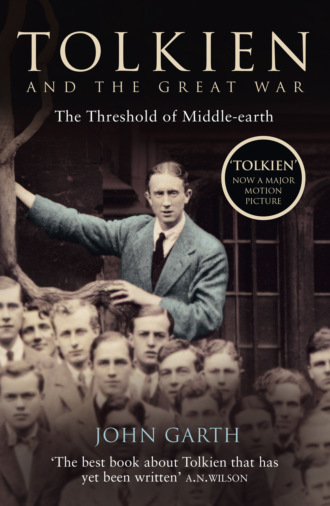
Полная версия
Tolkien and the Great War: The Threshold of Middle-earth
Also in the scrum against his own better judgment is T. K. Barnsley, known as ‘Tea-Cake’, an unflappably light-hearted young man who frequently dominates the TCBS with his brilliant wit. Tea-Cake likes to affect laconic expressions such as ‘full marks!’ and ‘I’ve got cold feet’ and to ride with reckless enthusiasm around Cambridge on a motorbike, never mind that such behaviour hardly befits a future Wesleyan minister. He and Smith have agreed to play on Tolkien’s team only if Rob Gilson is there too. Rob calls that ‘a left-handed compliment’: in other words, they know his rugby playing is even worse than theirs.
So Tolkien’s forwards are fatally compromised by the inexperience of Gilson, Smith, and T. K. Barnsley. The burden of the fight falls to the defensive three-quarter-backs, including the veterans Wiseman and Barrowclough. Barrowclough shakes off a reputation for apathy by charging half the length of the field through the enemy ranks to score first one try, then another. But from early on after the first try, the pressure from their younger opponents is unremitting, and only adroit tackling by Barrowclough and Wiseman keeps the school’s lead down. At half-time the score is 11-5 to the school First XV. The teams swap ends, and with the wind in his favour Barrowclough scores his second try and the scrum-half again converts. In the final minutes, though, the school increases its score to 14-10. For all their camaraderie, Tolkien’s ragged bunch retires defeated.
But there is dinner with old friends tonight, and the TCBS is not prone to take anything too seriously. These are happy days, and no less happy for being largely taken for granted. On leaving King Edward’s in 1911, Tolkien wrote nostalgically in the school Chronicle: ‘‘Twas a good road, a little rough, it may be, in places, but they say it is rougher further on…’
No one has foreseen just how rough the coming years will be, or to what slaughter this generation is walking. Even now, at the close of 1913, despite growing signs that war impends for this ‘over-civilized’ world, the time and manner of its unfolding are unforeseeable. Before four years have passed, the conflagration will have left four of Tolkien’s fifteen-strong team wounded and four more dead – including T. K. Barnsley, G. B. Smith, and Rob Gilson.
Of every eight men mobilized in Britain during the First World War, one was killed. The losses from Tolkien’s team were more than double that, but they bear comparison with the proportion of deaths among King Edward’s Old Boys and among former public schoolboys across Great Britain – about one in five. And they match the figures for Oxbridge-educated servicemen of their age, the vast majority of whom became junior officers and had to lead operations and assaults. It has become unfashionable to give credit to Oxford and Cambridge, and to social élites in general; but it remains true that the Great War cut a deeper swathe through Tolkien’s peers than among any other social group in Britain. Contemporaries spoke of the Lost Generation. ‘By 1918,’ Tolkien wrote half a century later in his preface to the second edition of The Lord of the Rings, ‘all but one of my close friends were dead.’
Конец ознакомительного фрагмента.
Текст предоставлен ООО «ЛитРес».
Прочитайте эту книгу целиком, купив полную легальную версию на ЛитРес.
Безопасно оплатить книгу можно банковской картой Visa, MasterCard, Maestro, со счета мобильного телефона, с платежного терминала, в салоне МТС или Связной, через PayPal, WebMoney, Яндекс.Деньги, QIWI Кошелек, бонусными картами или другим удобным Вам способом.


